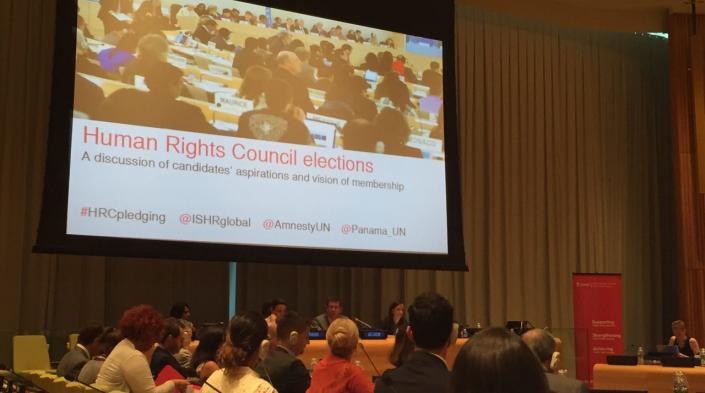
Publié le
Dernière mise à jour de cette page le
In an effort to bring a degree of transparency to elections for the UN Human Rights Council (HRC), Amnesty International, the International Service for Human Rights and the Permanent Mission of Panama to the United Nations hosted an event at UN headquarters in New York on 22 July. The UN itself has no formal process for public debate around candidates’ qualifications to serve on the HRC, so this joint event (in its fifth year now) is an excellent opportunity for candidates to present their platforms and for NGOs, UN agencies and other member states to question candidates on various human rights issues.
This year saw more candidates attend than in previous years, and a lively discussion both in the room and on Twitter (see #HRCPledging). Nine of the 17 candidates participated in the pledging event – Japan, Iraq, Tunisia, Croatia, Hungary, US, UK, Guatemala and Brazil. Eight candidates either declined the invitation or did not reply – Malaysia, Saudi Arabia, China, Egypt, Sierra Leone, South Africa, Russia and Cuba.
Questions ranged from country-specific issues like the US’s on police brutality and torture and Japan’s suppression of protests in Okinawa, to more general questions for all candidates, for example from UN Women on how candidates would advance Sustainable Development Goal 5 on Gender Equality through their membership at the HRC.
APC participated in the event to see how the candidates would use their membership to advance internet rights. We reminded candidates that the HRC recently passed a resolution on the enjoyment of human rights on the internet. The resolution called for the promotion of a rights-based approach to internet access, and in particular bridging the gender digital divide; condemned intentional disruption of access to or dissemination of information online; and called for an end to impunity for attacks on individuals for what they express online. Yet, we noted that human rights face many threats in the digital age – whether from surveillance of communications, disruptions of access to the internet, or the fact that half the world’s population is not online.
What the candidates said
A few candidates, as well as the Permanent Representative from Panama, who opened the session, already mentioned internet rights in their pledges. Specifically, Brazil, Tunisia and the US mentioned advancing human rights and freedom of expression online in relation to their role as lead sponsors of the aforementioned resolution, and in the case of Brazil, leadership on the resolutions on the right to privacy in the digital age as well.
How would candidates use their seats at the HRC to promote human rights online, and what practical steps will they take to implement the internet resolution at the national level?, we asked. Here is roughly how the candidates responded:
-
Guatemala: We just adopted a resolution on human rights on the internet at the HRC and will work to implement it at the national level.
-
Iraq: The internet is a vehicle for human rights issues, and bridging the digital divide is becoming very, very important. Iraq is a member of SDG 10, which is about removing inequality among countries. Technology today is a vehicle of providing information. It becomes an issue of how you provide it and how do you bridge the divide between those who have and those who have not. This is probably one of the issues Iraq would work on [at the HRC], and work with partners on it.
-
Brazil: Brazil has been a major sponsor of the resolution on the promotion, protection and enjoyment of human rights on the internet, along with others including Sweden. Brazil has also played a pioneering role with Germany on the protection of privacy in the digital age. Brazil is very gratified that the mandate of the Special Rapporteur on the Right to Privacy has been established. We will continue to pursue the issue not only at the HRC, but here at the UN General Assembly.
-
US: On internet freedom, we have all seen in the last several years a pretty concerted challenge from some states to what we refer to as the multistakeholder system of internet governance. Efforts by some states to turn what has evolved naturally as a global shared information space where all the people of the world can communicate with each other and argue in a sense from the same set of facts into a series of walled-off intranets controlled by governments. I think we had done quite a good job at the HRC and in the UN system collectively in pushing back against that challenge, in asserting that people everywhere have the same human rights online that they have offline, and in preserving the internet as the shared space that it has evolved into over the years. Outside of the UN, the US is engaged in a wide range of initiatives, both to create greater connection to the internet in places where people do not yet have that benefit. We launched last year the Global Connect Initiative with the aim of connecting 1.5 billion to the internet around the world. We’re also very, very focused on providing support to activists and others who come under cyber attack from repressive governments, and in helping people around the world gain the tools that they need to use the internet privately and securely.
-
UK: On the digital divide, the UK learns a lot from our membership in coalitions of the willing, like the Freedom Online Coalition. The FOC is itself an example of the multistakeholder approach, where we get together regularly with civil society and practitioners of the internet. We try to bring insights from the FOC into the HRC.
-
Tunisia: With regard to freedom of expression online, we contribute to the normative efforts at the Human Rights Council, particularly as a member of the core group on freedom of expression on the internet.
While none of the candidates explained exactly how they would advance internet rights at the HRC, or plans to improve internet rights at the national level, it was still revealing to see which aspects of internet rights they picked up on, and to get them on record pledging to support internet rights at the HRC in some respect. The webcast of the event can be viewed here.
What this means for the elections
The HRC elections will take place at the UN General Assembly sometime after it opens in mid-September. The founding resolution of the HRC states that “when electing members of the Council, Member States shall take into account the contribution of candidates to the promotion and protection of human rights and their voluntary pledges and commitments thereto.” Voluntary pledges typically state that the government will uphold international standards of human rights and enumerate actions undertaken by that state in advancing and protecting human rights. These are the only stated criteria for membership in the Council. While the annual pledging event is a critical step towards injecting a degree of transparency and accountability in the process, in reality states can and will vote however they would like, regardless of the human rights record of the candidate and their track record for cooperating with UN human rights mechanisms.
What is worse is that in many cases, the elections are not competitive. The five regional blocs are each assigned a specific number of seats and often decide among themselves how to divide them up. This year in the African Group and the Western Europe and Other Group there are as many candidates as available seats (known as “closed” or “clean” slates), so barring any last minute entries, we can expect Egypt, Sierra Leone, Tunisia, South Africa, the UK and the US to be elected. In Asia, Japan, Iraq, Malaysia, Saudi Arabia and China are competing for four seats; in Eastern Europe, Russia, Croatia and Hungary are competing for two seats; and in Latin America and the Caribbean, Cuba, Guatemala and Brazil are running for two seats.
For the competitive slates, we hope that the participation of candidates in the pledging event will boost their chances given their willingness to engage with civil society. Otherwise, what signal does it send regarding their fitness to serve as HRC members if they are not even willing to engage in an open debate on and scrutiny of their human rights records?
Next year we hope all candidates will attend, and we are grateful to Amnesty International and ISHR for their ongoing efforts to bring transparency and accountability to the HRC election process.
See also: HRC resolution on human rights on the internet. What really happened?


